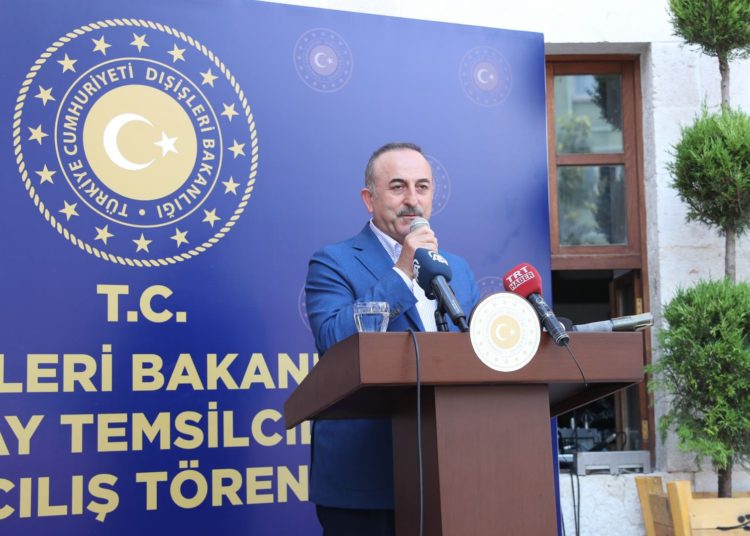Nordic Monitor
Activities of a Turkish Foreign Ministry representation office in the Turkish city of Antakya in southern Hatay province, situated near the area in Syria where the leader of the Islamic State in Iraq and Syria (ISIS) was killed last month, have drawn criticism from locals over the office’s alleged links to jihadist groups, a senior opposition lawmaker in the Turkish parliament claimed.
Mehmet Güzelmansur, deputy for the main opposition Republican People’s Party (CHP) from Hatay, revealed the reaction of residents to the presence of the Turkish foreign office in the city during a meeting of parliament’s Foreign Affairs Commission on October 23, 2019. Güzelmansur asked Deputy Foreign Minister Yavuz Selim Kıran, who also attended the commission meeting, the reason behind the ministry’s decision to set up an office in Hatay.
Ambassador Serdar Cengiz was assigned as head of the representation office in Antakya in May 2019, and the premises were officially inaugurated by Foreign Minister Mevlüt Çavuşoğlu in June. The office is considered by the local population to be a mission contributing to Turkey’s relations with rebel groups including jihadist militants. Hosting the regional headquarters of the National Intelligence Organization (MIT), Hatay is where clandestine intelligence operations were planned and executed in Syria.

Hatay is one of Turkey’s most ethnically diverse provinces, counting Arabs, Turkmen, Turks, Alawites, Christians and Kurds among its population. More than a third of its residents are of Arab Alawite descent. It has long had a reputation for being the country’s most tolerant region. In recent years, hundreds of thousands of refugees from Syria have also made it home since many of the Alawite and Sunni families living there are directly related to Syrian families. However, the Turkish government’s Syria policy, which has actively supported opposition groups against the Assad al-Bashar government since 2011, invited divisions and sectarian blowback closer to the region.
Hatay borders the Syrian governorates of Latakia and Idlib and has become an important location for Turkish-backed rebel groups. According to some experts, jihadist groups have enjoyed a safe haven in Hatay for medical care and the strategic planning. The US recently conducted a military operation that ended the life of ISIS leader Abu Bakr al-Baghdadi. The compound where al-Baghdadi died was located in the small northwestern Syrian village of Barisha, some five kilometers (three miles) from the village of Kavalcik in Hatay province. The killing of al-Baghdadi shed light once again on the activities of jihadist groups in the region.
In his speech before the commission Güzelmansur underlined the growing uneasiness of local residents with the activities of Turkish diplomats in Hatay, saying the public view diverges from the official narrative behind opening the Foreign Ministry representation office. Güzelmansur urged Deputy Foreign Minister Kıran to clarify if “the office was established for another purpose [referring to the Foreign Ministry office’s links to jihadist groups].”
According to Kiran, Turkish diplomats who serve in Hatay are expected to report on the latest developments in Syria, and the office provides the ministry an opportunity to reach out directly to “Syrian representatives.”

Nordic Monitor previously reported how Hatay was used as a transit point by Turkish intelligence for illegal arms transfers to jihadist groups in Syria under a scheme that was not authorized and in which weapons were secretly transported in trucks. A truck full of heavy arms was intercepted by security forces on January 1, 2014 near the Turkish village of Torun on the highway between the towns of Kırıkhan and Reyhanlı in Hatay. According to judicial documents, public prosecutors were prevented from executing a warrant by MIT agents who were accompanying the truck. Yener Akbaydar, then-regional head of MIT in Hatay, was also involved in the case.
Furthermore, the Turkish military set up the Operations Coordination Center (HKM) in February 2016 for the training of rebels in Yayladağı, a town in Hatay province. One hundred seventeen militia members were trained at the HKM in asymmetrical warfare, sabotage, infiltration, improvised explosive devices, explosives and guerrilla tactics, Nordic Monitor revealed in June 2019.
Hatay has also been transformed into a transit point where Turkish soldiers, military equipment and armored vehicles cross into Idlib in Syria. Turkey and Russia reached an agreement in Sochi in September 2018 according to which Turkey should have prevented terrorist groups from conducting attacks on Syrian soil. However, Idlib has been taken over by militants of Hayat Tahrir al-Sham (HTS), the latest incarnation of the al-Nusra Front, in the months since the agreement was signed.












